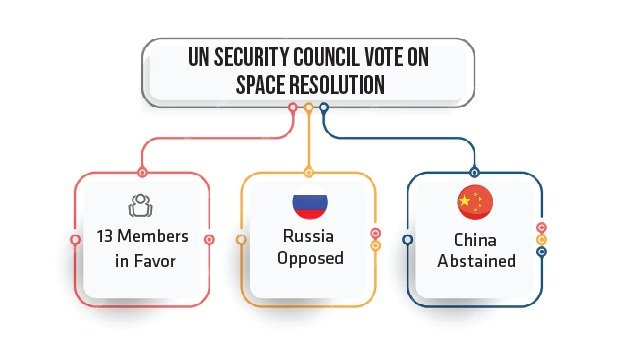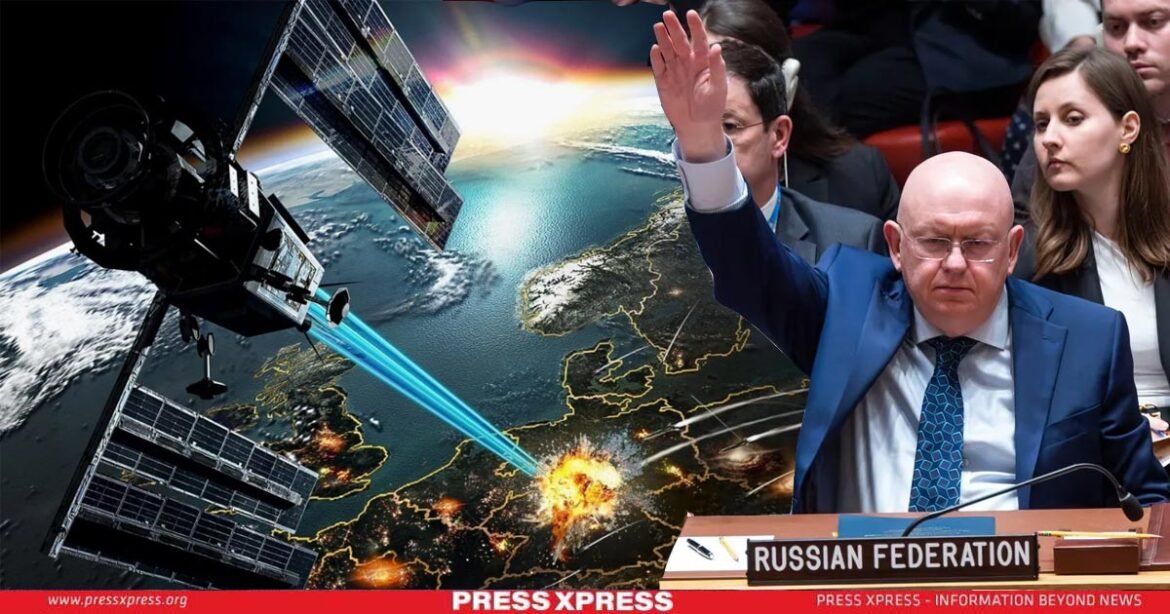Key Highlights:
- US and Japan co-sponsored a resolution to ban the deployment of nuclear arms and other weapons of mass destruction in space
- 13 out of 15 Security Council members supported the resolution
On 24 April, Wednesday, Russia vetoed a UN Security Council resolution sponsored by the United States and Japan that called on all nations to prevent a dangerous nuclear arms race in outer space. The resolution was supported by 13 council members, with China abstaining.
The resolution would have called on countries to refrain from developing or deploying nuclear weapons or other weapons of mass destruction in space, as prohibited under the 1967 Outer Space Treaty. It also emphasized the need for further measures, including legally binding instruments with verification provisions, to prevent an Space arms race.
You can also read: China Hosts WPNS Meeting to Promote Stability in Pacific Waters
Russia’s UN Ambassador Vassily Nebenzia dismissed the resolution as “absolutely absurd and politicized,” arguing that it did not go far enough in banning all types of weapons in space. Russia and China proposed an amendment that would call for the prevention of the placement of any weapons, not just weapons of mass destruction, in outer space. However, this amendment was defeated.

Conflicting Narratives and Accusations
US Ambassador Linda Thomas-Greenfield questioned Russia’s motives, asking why it would veto a resolution that reaffirms existing rules if it has no intention of deploying nuclear weapons in space. US National Security Advisor Jake Sullivan echoed this sentiment, stating that if Russia has no such intentions, it would not have vetoed the resolution.

In response, Vassily Nebenzia accused the US and its allies of announcing plans to place weapons in outer space, which the US denied. He also claimed that the US has been blocking a Russian-Chinese proposal since 2008 for a treaty against putting weapons in outer space.
Thomas-Greenfield, on the other hand, accused Russia of undermining global treaties to prevent the spread of nuclear weapons, invoking “dangerous nuclear rhetoric,” and refusing to engage in substantive discussions around arms control.
Concerns Over Potential Nuclear Weapons in Space
The veto by Russia has raised concerns about the potential development and deployment of nuclear weapons in outer space, which could have catastrophic consequences for global communications, scientific, and security services. UN Secretary-General António Guterres warned that geopolitical tensions and mistrust have escalated the risk of nuclear warfare to its highest point in decades, emphasizing the need to prevent a “sequel to Oppenheimer” – a reference to the development of the atomic bomb.
Is Russia Poised to Unleash Nuclear Fury in Space Amidst Ukraine Crisis?
Russia’s incursion into Ukraine, igniting Europe’s most significant land conflict since World War II, has elevated concerns about the potential deployment of nuclear weapons in space. This geopolitical turmoil has strained relations between the United States and Russia, the two foremost nuclear powers globally.
Amid these tensions, the White House has intensified apprehensions by commenting on the possibility of Russia developing nuclear weapons for space deployment. Experts warn that such weaponry could pose a grave threat to satellite constellations like SpaceX’s Starlink, crucial for Ukrainian defenses against Russian forces.

Photographs from the conflict zone depict Ukrainian servicemen positioned beside Starlink-equipped vehicles, underscoring Ukraine’s reliance on this technology for strategic advantage. Moreover, reports indicate Russia’s potential circumvention of sanctions to exploit similar satellite systems, further escalating concerns.
Observers speculate that Russia might view nuclear space weapons as a last resort, given the reciprocal damage they could inflict on Russian satellites in the vicinity. Russian President Vladimir Putin’s statements affirming Moscow’s readiness to employ nuclear arms under existential threats have heightened global anxieties.
Putin’s advocacy for space projects, including proposals for nuclear-powered systems, underscores Russia’s strategic priorities. Notably, Russia’s prior deployment of tactical nuclear weapons to Belarus and discussions regarding the use of strategic nuclear assets in territorial defense highlight the evolving dynamics in the region.
As geopolitical tensions persist and technological advancements blur the lines between conventional and space warfare, the specter of nuclear conflict in space looms large, necessitating careful diplomacy and international cooperation to mitigate risks and maintain stability.

What are Space Weapons?
Space weapons encompass a range of technologies and systems designed for use in space or to affect objects in space. One of the most notable types is the antisatellite weapon (ASAT). ASATs are specifically engineered to interfere with other satellites, either by physically destroying them or rendering them inoperable through non-kinetic means such as electromagnetic jamming, lasers, or cyberattacks. These weapons can be deployed from Earth’s surface or from space itself, targeting objects in orbit around Earth or beyond.
3 primary categories of space weapons
Earth-to-space weapons: These are launched from Earth’s surface and target objects in space, such as satellites.
Space-to-space weapons: Deployed and operated in space, these weapons engage with other objects in space, including satellites and other spacecraft.
Space-to-Earth weapons: Designed to target objects on Earth from space, these weapons pose unique challenges and ethical considerations.
Laws and Treaties Regulating Space Weapons
In the realm of international law, several treaties and agreements aim to regulate the militarization of space and prevent the escalation of conflict beyond Earth’s atmosphere. Two key treaties addressing space weapons are:
Partial Test Ban Treaty (PTBT): Enacted in 1963, the PTBT prohibits nuclear detonations in outer space and underwater environments. By restricting nuclear testing in these domains, the treaty aims to mitigate the potential for catastrophic consequences and environmental damage.
Outer Space Treaty (OST): Adopted in 1967 by 114 countries, the OST is a cornerstone of space law. Article IV of the treaty explicitly prohibits the placement of weapons of mass destruction (WMD) in outer space, including their testing and deployment. This provision aims to prevent the weaponization of space and maintain it as a peaceful domain for exploration and scientific endeavors.
Despite these treaties, the development and deployment of space weapons continue to pose challenges to international security and stability. Countries such as the United States, Russia, India, and China have demonstrated capabilities in antisatellite weaponry.
As humanity ventures further into space, the regulation of space weapons becomes increasingly critical. While international treaties provide a framework for managing the militarization of space, ongoing developments in technology and geopolitical dynamics necessitate continual evaluation and adaptation of regulatory measures. By promoting transparency, cooperation, and responsible behavior in space activities, nations can work together to ensure the peaceful exploration and utilization of this celestial frontier for generations to come.
Conclusion
As geopolitical tensions persist and technological advancements blur the lines between conventional and space warfare, the specter of nuclear conflict in space looms large, necessitating careful diplomacy and international cooperation to mitigate risks and maintain stability.


